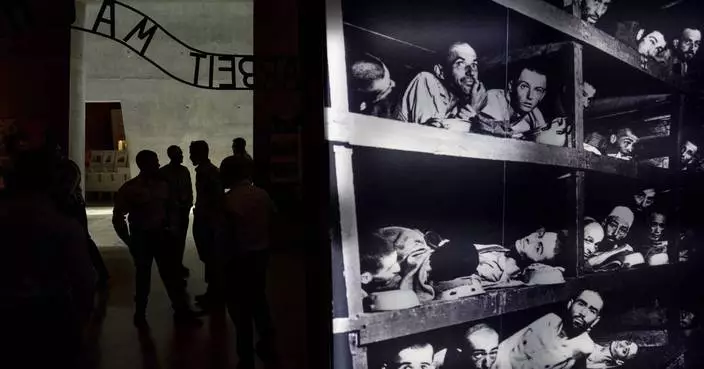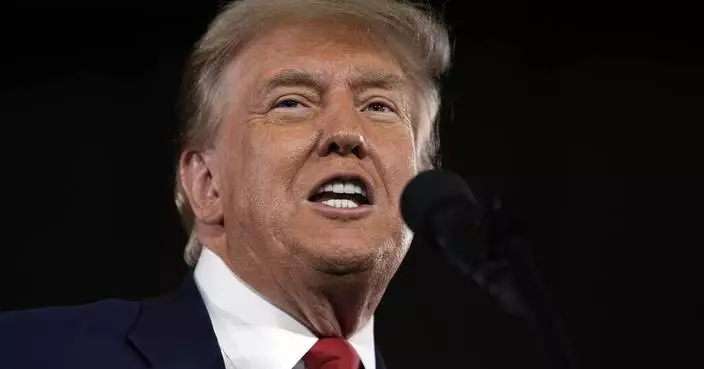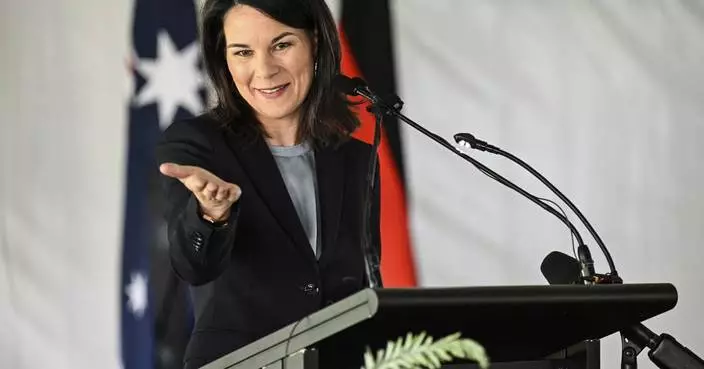Germany's transport minister says the government is ordering automaker Daimler to immediately recall 238,000 vehicles equipped with software that turns off emissions controls under certain conditions.
Minister Andreas Scheuer made the statement Monday after a meeting with Daimler CEO Dieter Zetsche. Scheuer said that Daimler was willing to work "with cooperative transparency" with the government and "at maximum speed."
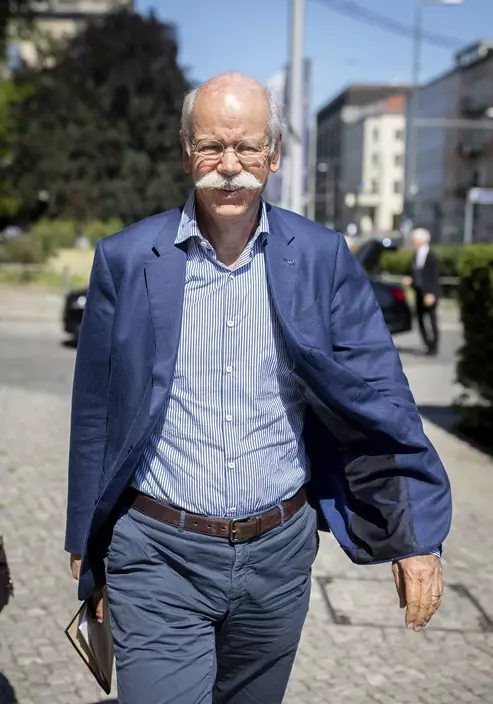
Dieter Zetsche, CEO of German car maker Daimler arrives for a meeting at Germany's Traffic and Infrastructure Ministry in Berlin on Monday, June 11, 2018. (Kay Nietfeld/dpa via AP)
Scheuer said the recall was ordered after "intensive and hours-long negotiations" with Daimler.
The affected vehicles include the Mercedes-Benz Vito delivery van and the Mercedes GLC 220d and C220d.
Europe-wide some 774,000 vehicles are affected, the ministry said. The ministry statement did not say whether those cars outside of Germany would be recalled.
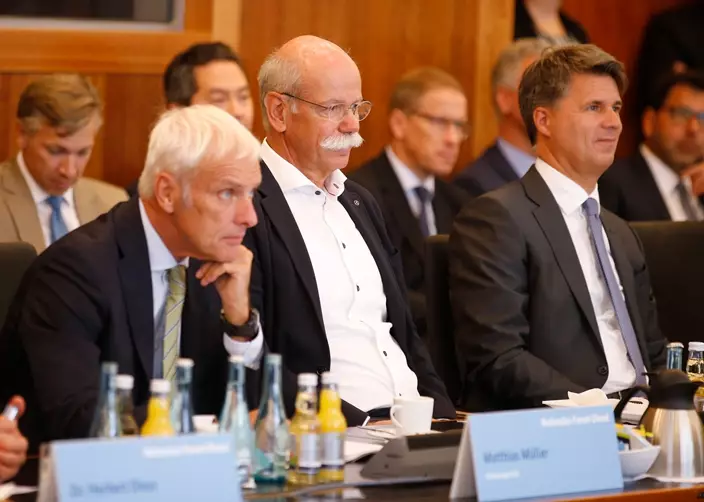
FILE - In this Aug. 2, 2017 file photo Harald Krueger, CEO of German car maker BMW, Dieter Zetsche, chairman of German car maker Daimler AG and head of Mercedes-Benz cars and Matthias Mueller, CEO of German car maker Volkswagen, from right, attend a so-called diesel summit in Berlin. German government officials and automakers met to discuss the future of diesel vehicles. (Axel Schmidt/Pool Photo via AP, file)
Diesels have been under heavy scrutiny since U.S. authorities caught Volkswagen using illegal engine control software that turned off diesel emission controls in everyday driving. Subsequent investigations showed that other automakers had exploited European regulatory loopholes that allowed emissions controls to be relaxed at certain temperatures to avoid engine damage.
Daimler said in a statement only that it "confirmed the recall" and added that "open legal questions will be clarified in appeal proceedings." The company had earlier said that it contested the legal basis for the finding that the Vito's engine controls were disallowed.
Daimler has already announced a voluntary recall of some 3 million diesels to install a software fix intended to reduce emissions.
Diesels are additionally under more pressure as German cities with excessive pollution levels contemplate limited diesel bans to come into compliance, under pressure from environmental groups. The city of Hamburg introduced a ban on older diesels on two streets suffering from excessive pollution levels on May 31.
The Stuttgart-based automaker has said the U.S. Department of Justice has inquired about the company's emission certification processes, and that German prosecutors in Stuttgart are investigating Daimler employees on suspicion of fraud and criminal advertising. The company says it is cooperating with authorities.
BERLIN (AP) — Germany said Monday it recalled its ambassador to Russia for a week of consultations in Berlin following an alleged hacker attack on Chancellor Olaf Scholz’s party.
Germany last week accused Russian military agents of hacking into the top echelons of Scholz's Social Democrats’ party and other sensitive government and industrial targets. Berlin joined NATO and fellow European countries in warning that Russia’s cyberespionage would have consequences.
The Foreign Office in Berlin said Monday that the government is taking the latest incident “seriously” and that Foreign Minister Annalena Baerbock had decided to call back German Ambassador Alexander Lambsdorff. He would return to Moscow after a week, it said.
“The German government takes this event very seriously as behavior against our liberal democracy and the institutions that support it," Foreign Office spokeswoman Kathrin Deschauer said.
Baerbock said last week that Russian military cyber operators were behind the hacking of emails of the Social Democrats, the leading party in the governing coalition. Officials said the hackers had exploited Microsoft Outlook.
The German Interior Ministry said in a statement last week that the hacking campaign began as early as March 2022, a month after Russia’s full-scale invasion of Ukraine, with emails at the Social Democrat party headquarters accessed beginning that December. It said German companies, including in the defense and aerospace sectors, as well as targets related to the war in Ukraine were the focus of the hacking attacks.
The statement said international efforts led by the FBI shut down in late January a botnet of compromised network devices used by the Russian hackers — known as APT28 or Fancy Bear. The group has a history of malicious and destabilizing behavior, according to the U.S. State Department.
German officials said the attacks persisted for months.
Relations between Russia and the West have been tense since Moscow's attack on Ukraine. The U.S., Germany and many other European countries have been providing military support to Ukraine in the ongoing war.
In Copenhagen, Finnish Prime Minister Petteri Orpo said that “some Europeans still think that the war is only taking place in Ukraine, but right now we are seeing more and more aggressiveness from Russia.”
“We will probably see hybrid attacks in different areas. It can be critical infrastructure,” he added after a meeting with his Danish counterpart Mette Frederiksen. “What Russia is doing and planning is not acceptable. Russia is ready to use any means possible to harm our societies.”
In Prague, the Czech Foreign Ministry summoned Russia’s ambassador over the attacks by the same APT28 group linked to Russia’s GRU military intelligence unit.
“I have decided to summon the Russian ambassador because of the cyber attacks against Czech institutions and critical infrastructure,” Foreign Minister Jan Lipavsky said on X, the social media network. “We have called on the Russian Federation to refrain from this behavior, which is contrary to UN standards and its own obligations.”
—-
Jan Olsen in Copenhagen, Denmark and Karel Janicek in Prague, Czech Republic contributed.

FILE - Then European Union Election Observation Mission to Myanmar chief Alexander Graf Lambsdorff speaks during a press briefing in Yangon, Myanmar, Tuesday, Nov. 10, 2015. The German foreign office says that Germany has called back its ambassador to Russia for a week of consultations, following an alleged hacker attack on Chancellor Olaf Scholz’s party. The ministry said Monday, May 6, 2024 that the government is taking the incident “serious.” (AP Photo/Gemunu Amarasinghe, File)







